When a fleet manager estimates expenditures, he takes into consideration both fixed and operating costs. The volume of fixed costs – taxes, insurance, licenses, permits, depreciation, lease payments – doesn’t depend on the fleet manager’s talents. Operating costs are different and highly affected by driving safety and the availability of solutions to control the following aspects:
- Fuel – the largest fleet expense;
- Maintenance and part replacement;
- Traffic tickets and tolls;
- Accident management.
The cost per mile of your fleet consists of fixed costs plus variable costs divided into miles traveled. To cut it, a fleet manager should either decrease mileage or variable costs.
- The bad news is that variable costs are usually several times higher than fixed costs.
- The good news is that a fleet manager can manage them and cut costs multi-fold.
Mileage minimization is the basics of fleet management. Fleet managers easily achieve it through optimized routes and the elimination of private trips.
Just recently, we described fuel monitoring and maintenance management in detail. But there’s one thing that influences almost all operating expenditure items.
The thing is driving style.
How driving style affects operating costs

At least the three most significant operating costs depend on driving quality.
Fuel consumption
On average, fuel accounts for 60% of fleets’ operational costs. ECTRI claims that “driving style can result in differences in terms of fuel consumption up to 40% between a calm driver and an aggressive one.”
Maintenance
Reckless driving intensifies vehicle wear and becomes a cause of traffic accidents. It means that instead of transporting people or goods, the vehicle will spend most of the time at a service station.
Moreover, the risk of costly critical breakdowns rises with every speeding, acceleration, harsh braking, cornering, and excess RPMs.
The International Journal of Scientific Research and Innovative Technology claims that “speed is the most important factor in fuel consumption and maintenance costs.”
Accidents and traffic tickets
If the driving style is out of control, traffic citations, repair, and maintenance work orders will drain your budget as fast as uncontrolled fuel thefts. But the worst thing for the business is vehicle downtime due to accidents, resulting in interrupted supply chains, delay penalties, damaged goods, and injured people in the worst case.
How to control and enhance driving quality in CIRCUMSPECTOR?
Being focused on driving safety solutions, KLOUDIP released the CIRCUMSPECTOR. The software gives companies a chance to prevent accidents, rather than pay for the consequences. Check out the quick demo video to get the idea, before diving into details:
Prepare your vehicle
CIRCUMSPECTOR can receive driving style data from any vehicle, where a tracker with an accelerometer or factory telematics is installed.
Contact us to know if your vehicle can send driving quality data to the app or how to get GPS on board.
Configure data sending
When you register the vehicle in the system, the app starts receiving driving quality data from a vehicle.
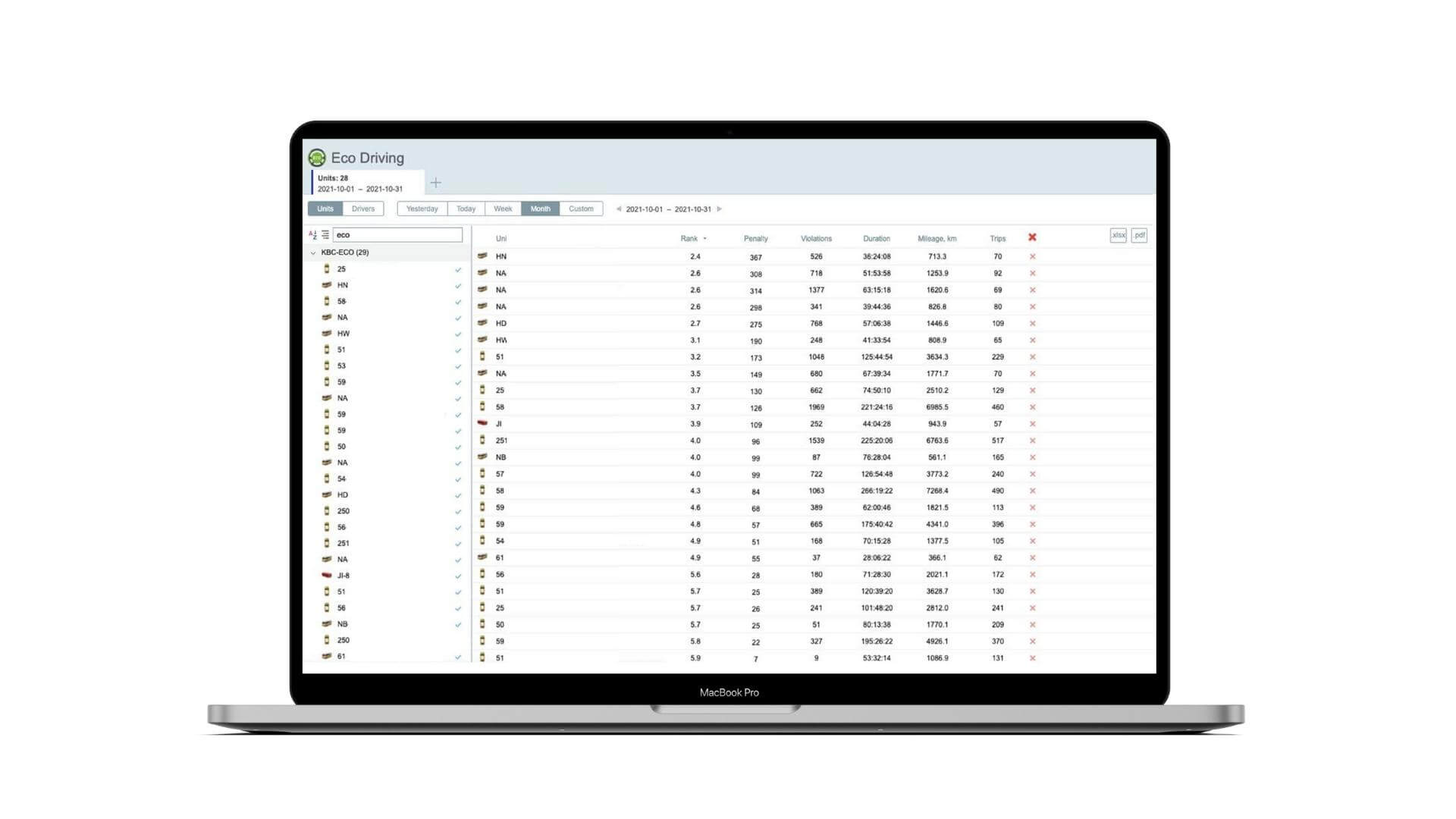
Set up driving quality criteria
CIRCUMSPECTOR allows controlling any types of violations. But before that, you need to configure the app to detect them. To start, select the criteria you want to control:
- Speedings;
- Accelerations;
- Brakings;
- Sharp turns;
- Reckless driving;
- Any other criteria – moving on a wrong gear or increased RPM – that you consider a violation.
You can also add several severity levels – minor, medium, grave – for each violation.
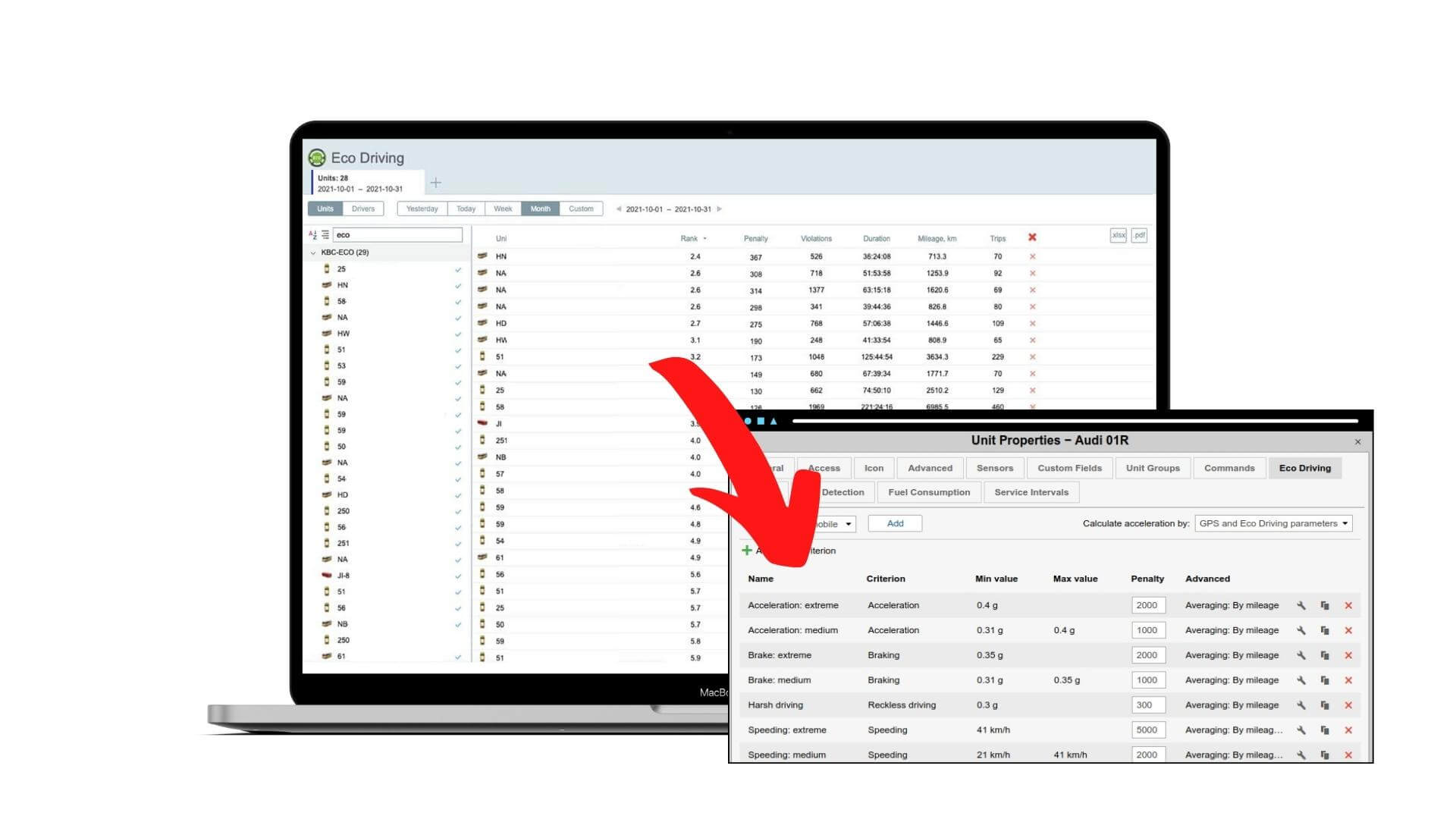
Add the corresponding G values
The system detects violations based on G-values. You need to add a corresponding G-value to each violation, for example:
0.4 g for harsh acceleration means that when a car starts gathering speed with g-force 0.4 or more, CIRCUMSPECTOR registers the violation.
The same with all other violations.
As told above, the system lets you register minor, medium, and grave violations. For that, you need to add these three types of violations to the control list and add different G-values to each, e.g.:
0.3-0.39 g for medium acceleration, and 0.2-0.29 for the minor violation.
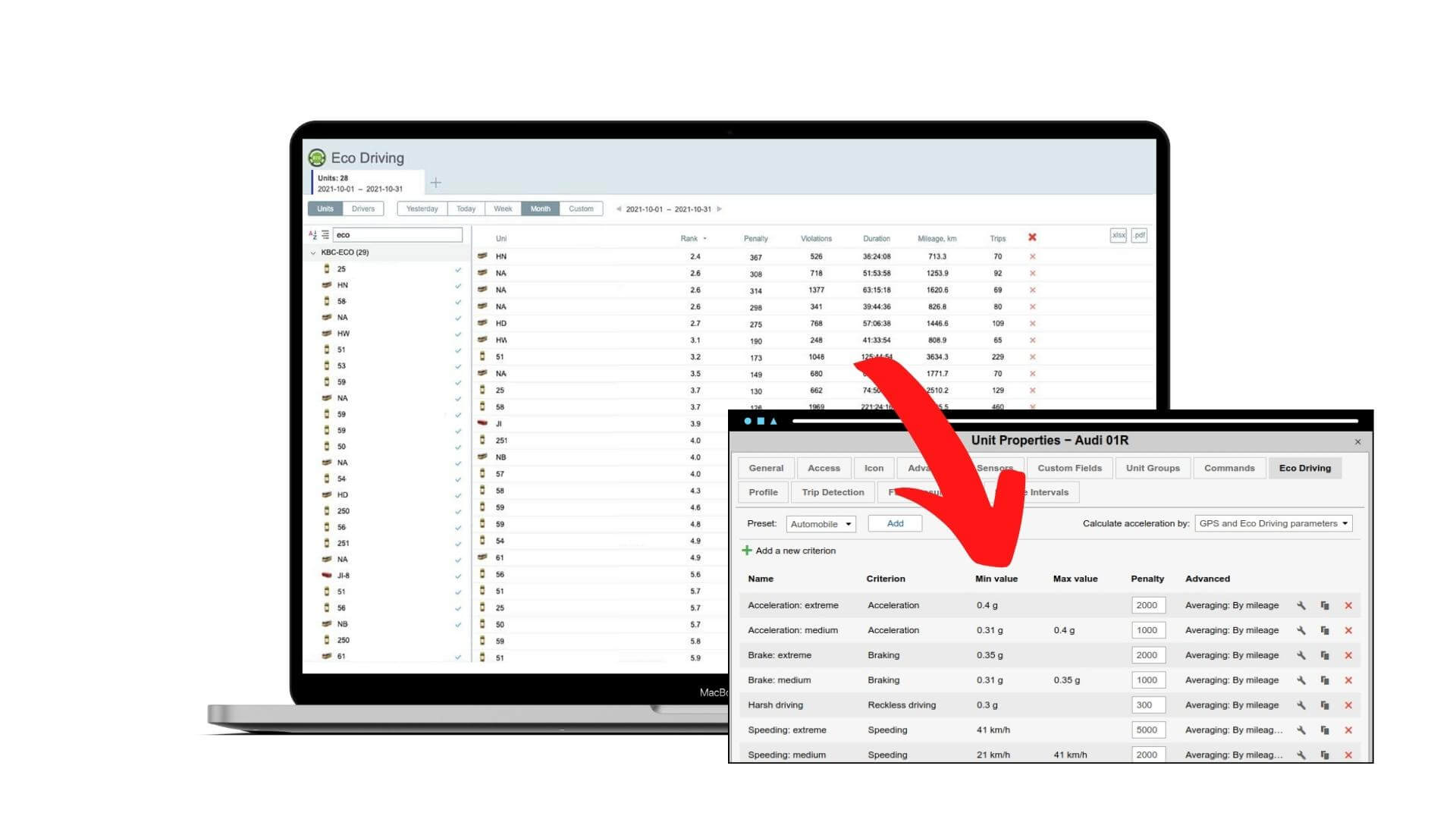
Define penalty points
CIRCUMSPECTOR uses penalty points to rank drivers or calculate personal driving quality score – if you use it for a private vehicle.
You can add different penalty points depending on the violation severity, for example, 2000 points for extreme acceleration and 1000 for medium braking.
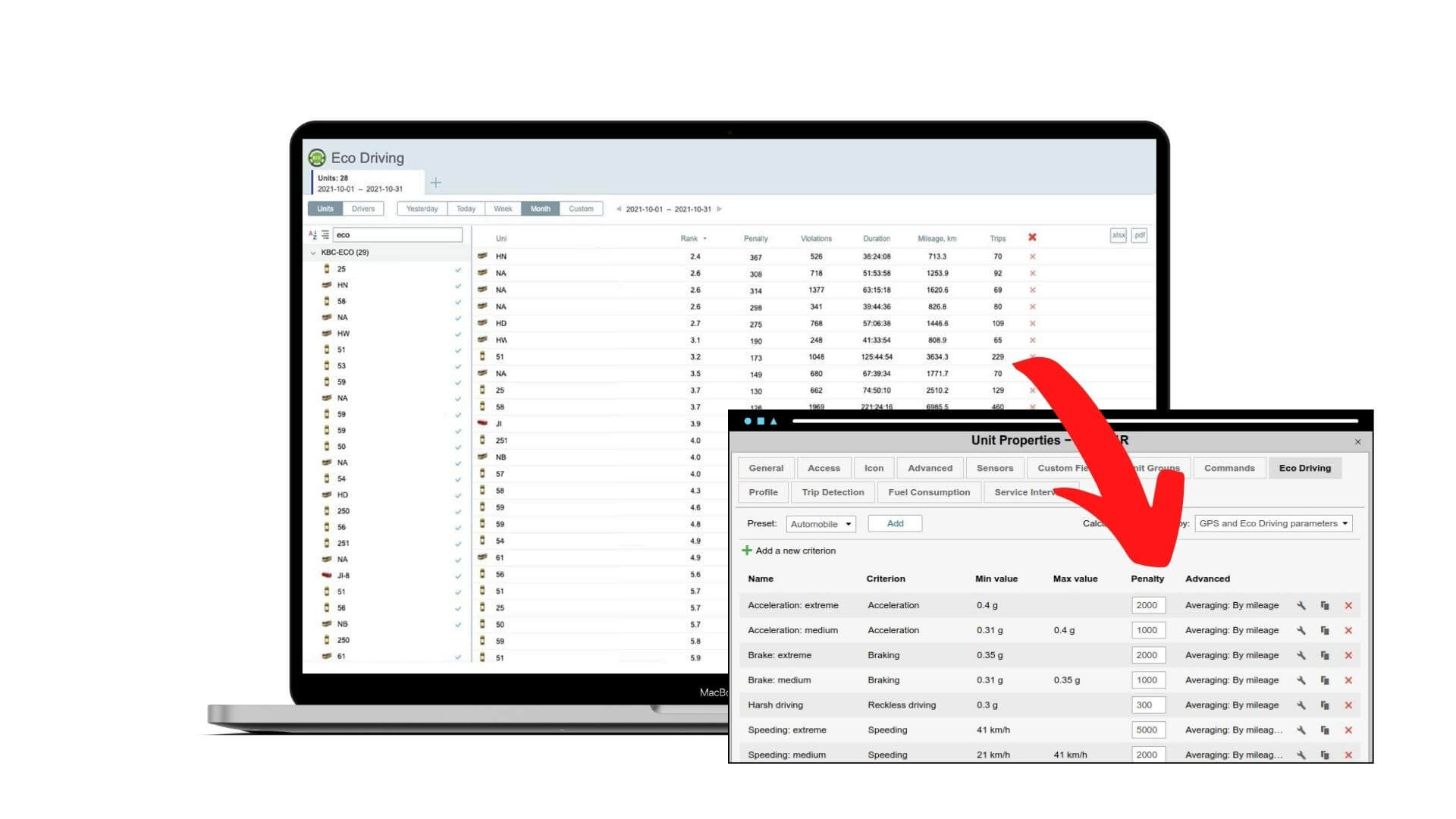
Quick configuration
If you configured CIRCUMSPECTOR for one vehicle, you can export the criteria to file and apply it to any other vehicle in your fleet.
KLOUDIP tested the app on different types of vehicles and generated driving quality control templates for cars, trucks, and buses. That way, if you don’t know which G-values correspond to certain violations, you can apply a standard driving quality control configuration to your vehicle.
All you need is to select “Automobile,” “Truck,” or “Bus” from the dropdown list and enjoy a complete list of violations with the corresponding G-values.
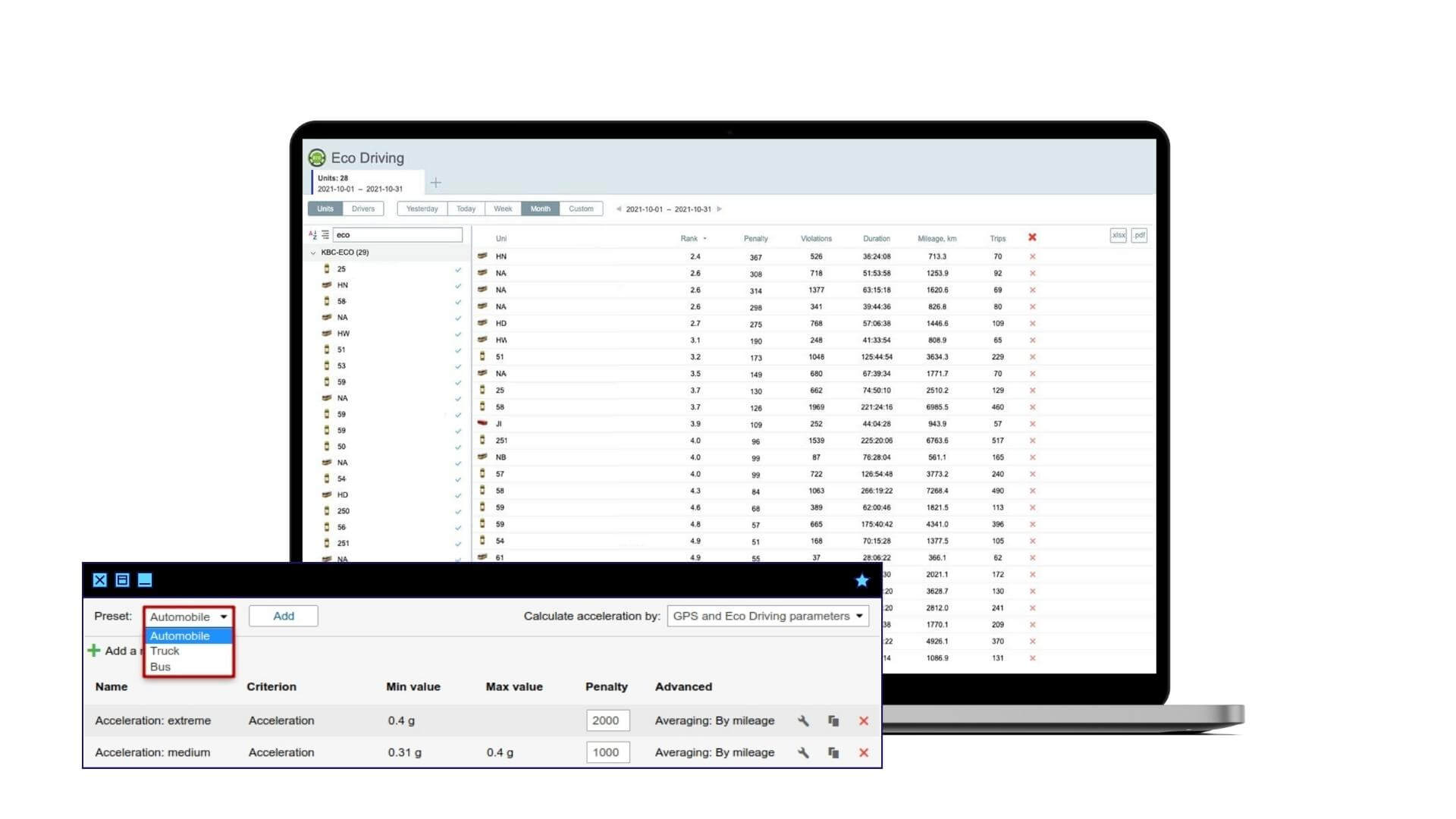
Penalty multiplicators
CIRCUMSPECTOR supports 2,400 GPS devices and dozens of additional sensors. Each sensor can be a multiplier to violations.
For example, if a truck is moving fully loaded or a bus is crowded with people, then every violation should be penalized more severely. For that, use the axle loading sensor as a validator.
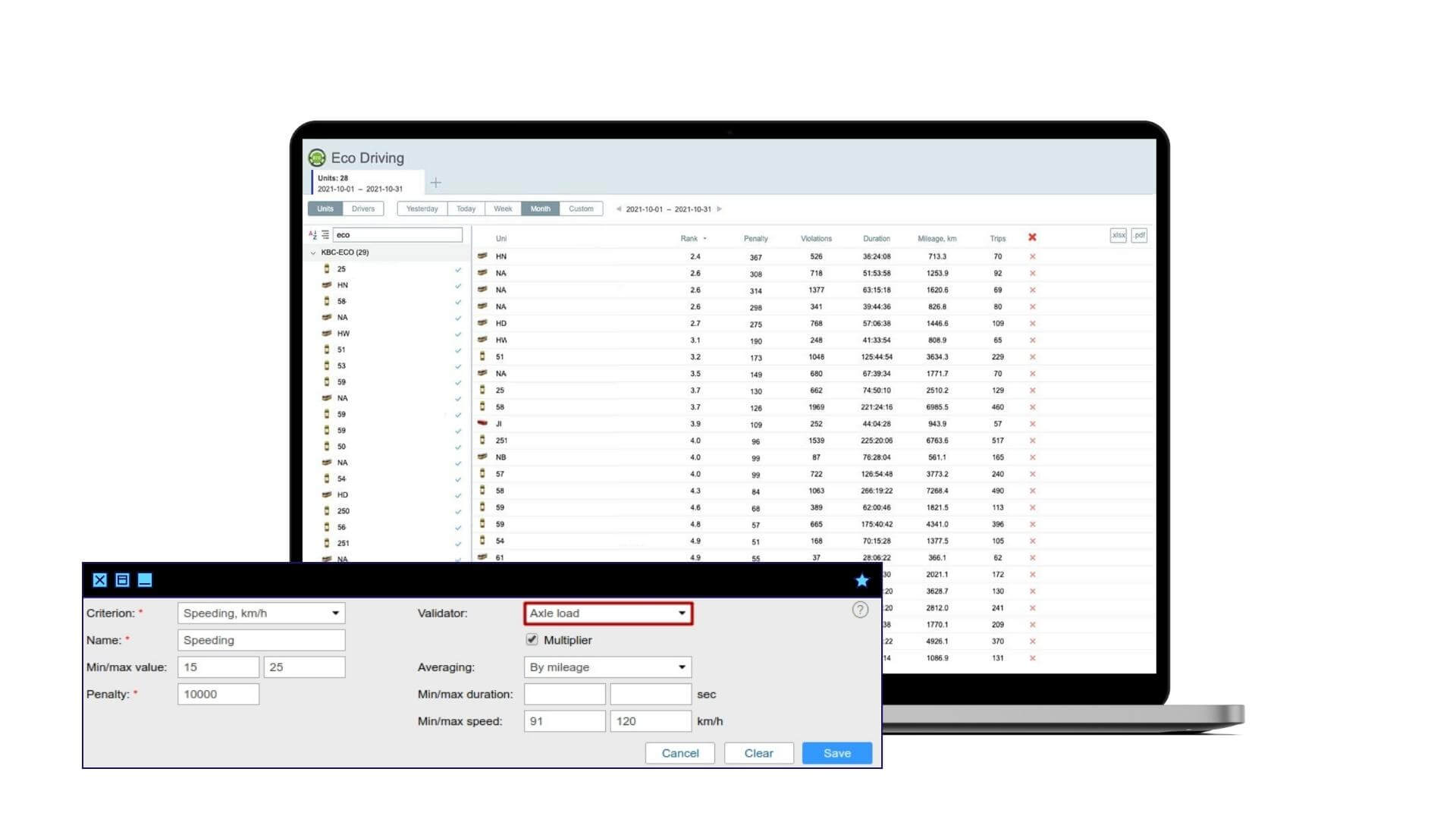
The “Validator” dropdown list contains all sensors installed in your vehicle. Select an “Axle load” sensor and activate the “Multiplier option.” Now, if the axle load sensor shows that the vehicle is under load, all penalty points will be multiplied. This will make drivers behave more diligently with people or cargo on board.
Honest ranking
For one day, CIRCUMSPECTOR registers 10 violations for one driver and 15 for another. At first sight, the second one is reckless. But then you see that the first driver made only one 5-minute trip, while the second one was on the wheel for the whole day. It makes the ranking not that definitive.
To avoid this, CIRCUMSPECTOR can average the score by mileage or time. The feature divides penalty points by miles or minutes in trips. It allows a fleet manager to see the real picture of driver behavior across the company.
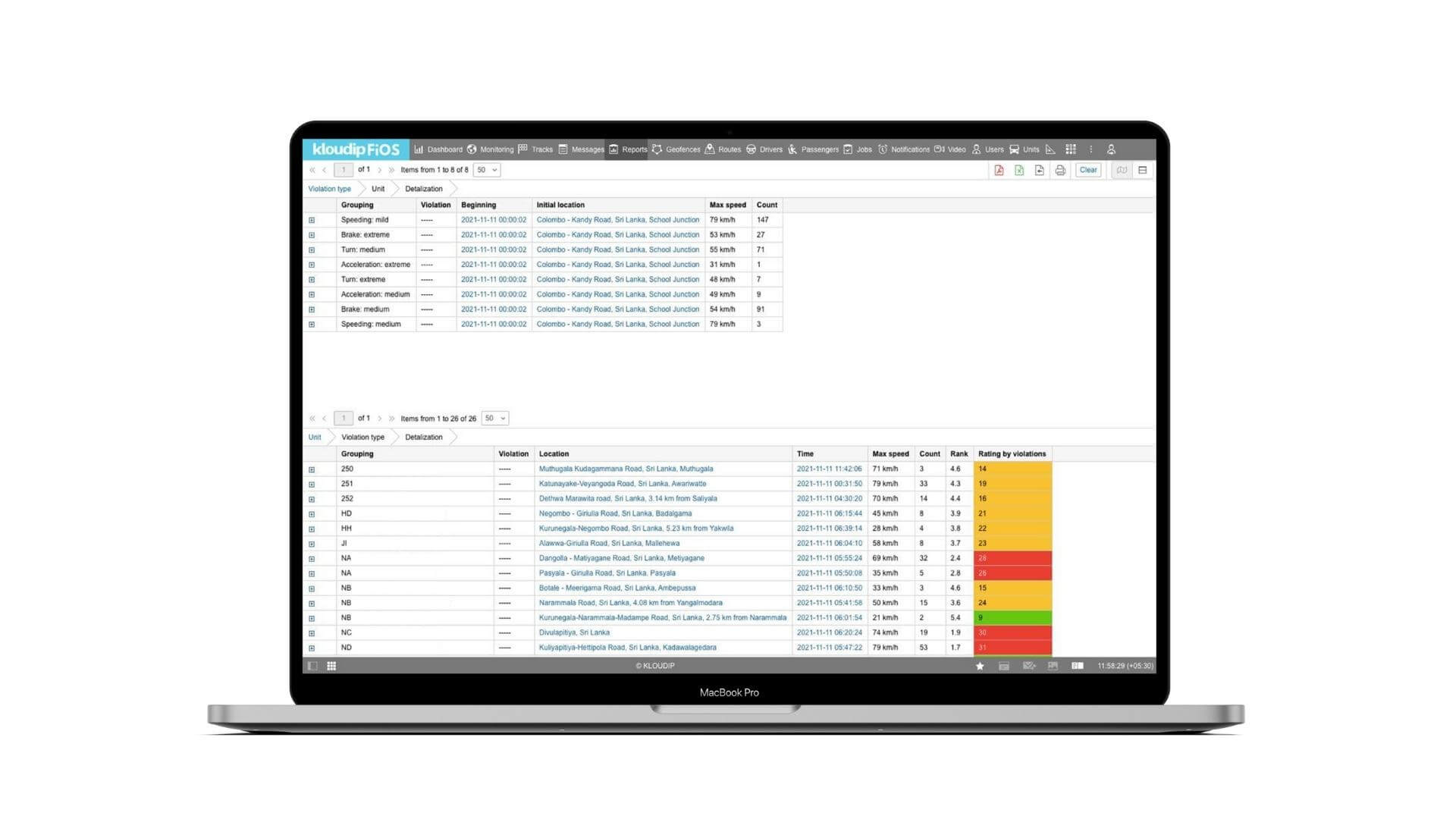
Driving quality visualization
CIRCUMSPECTOR displays traffic violation history and driving quality score for each vehicle in the fleet. Select the vehicle, time interval, and watch it:
- Charts show violations, penalties, and driving scores in separate rides, considering their duration.
- The violation list describes each case of unsafe driving in detail, including its location, date and time, and a person on the wheel.
- Maps display violation markers of different colors depending on their severity.
- Driver ranking shows the list of drivers in your fleet from bad to worse, or vice-versa.
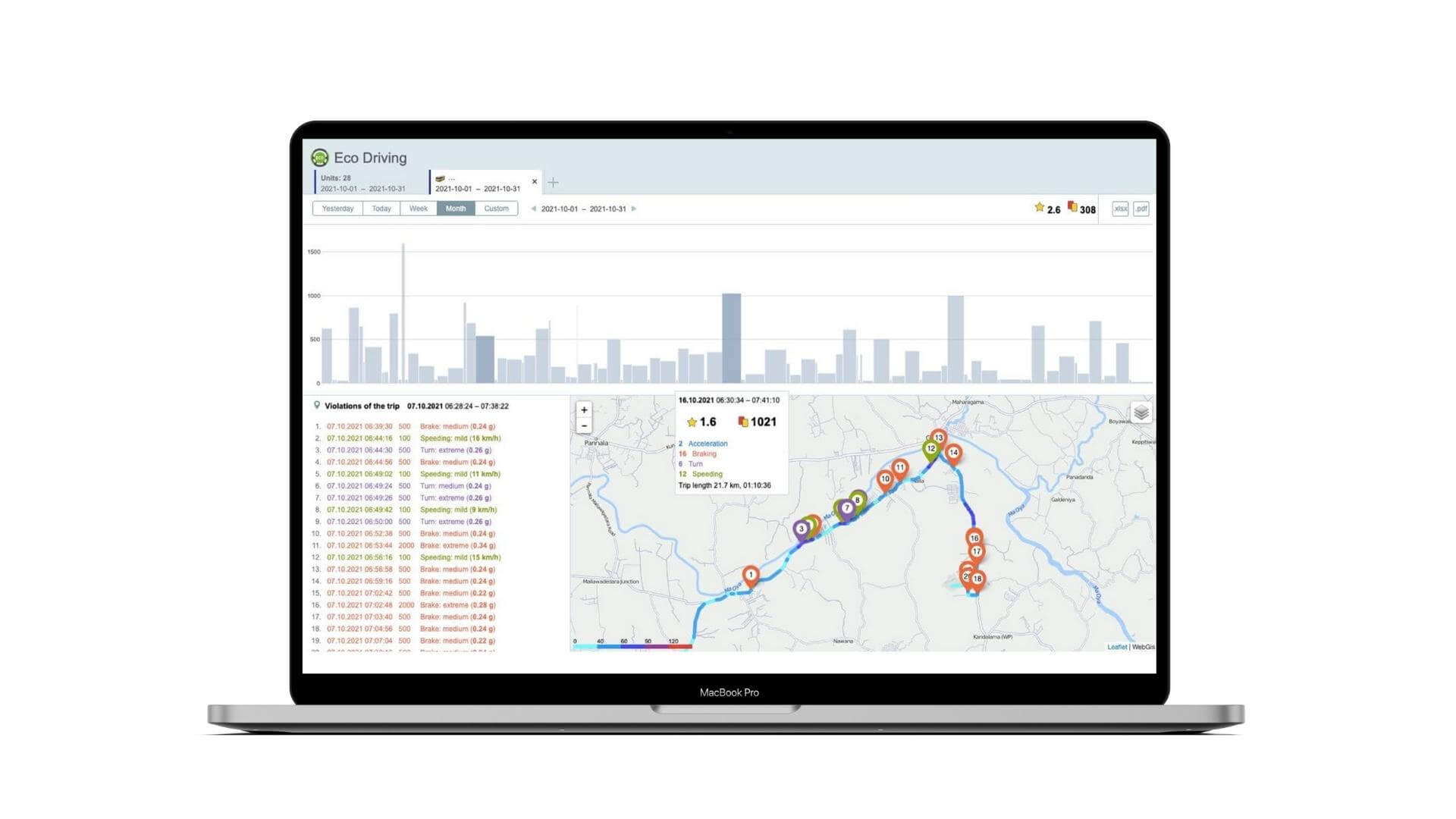
Real-time driving safety monitoring solutions
With CIRCUMSPECTOR, you don’t need to stare at the screen all the time. When critical violations happen, the system will alert you by e-mail, SMS, or in a pop-up window (similar to browser notifications) in real-time.
Moreover, you can configurе the system to automatically send driving safety reports on schedule, e.g. every day, week, month.
Who benefits from CIRCUMSPECTOR?
KLOUDIP developed the app for any person and company interested in safer driving. If you keep paying traffic tickets or seem to spend too much on maintenance and fuel, then you will benefit from CIRCUMSPECTOR. Here are just a few implementation examples:
Parents
Check how teen drivers behave on the road, can head to them in case of an accident, or train young drivers depending on what mistakes they make.
Car rental companies
Give discounts to diligent drivers and penalize the reckless ones. As a result, more vehicles will be available to clients, and fewer cars will idle at the service station.
Insurance companies
Use driving quality data to identify the causes of accidents, adjust rates for diligent drivers, and ensure a more precise risk assessment.
Transportation companies
By preventing accidents, the company ensures an uninterrupted supply chain and avoids delay fines.
Taxi companies
If a small taxi service wants to compete with Uber, why not make driving safety their top priority and unique feature?
Implementation results
Brandix established a driver training & reward system based on CIRCUMSPECTOR driving safety solutions in South Asia. The company provides personalized training, salary bonuses, or penalties based on employees’ driving quality.
At the Telematics conference in Colombo, Brandix reported preventing 90% of traffic accidents monthly and significant fuel economy across the fleet.
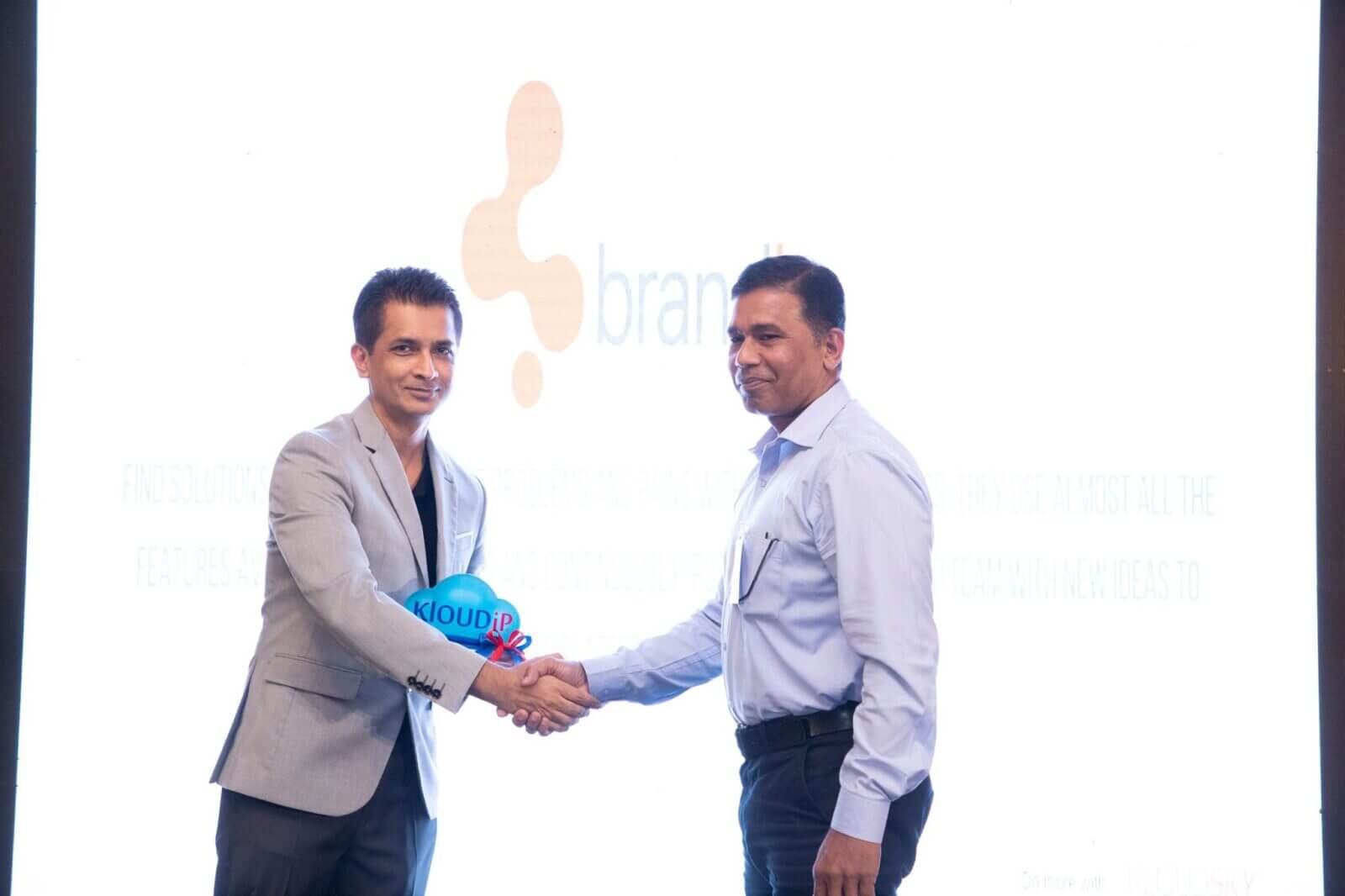
Summary
Even the knowledge of being monitored makes the drivers behave more careful, which results in:
- Minor violations and fewer traffic tickets;
- Safer roads;
- Undamaged cargo and unharmed people;
- Vehicles remaining in good technical condition for a longer period;
- Minimized CO2 emissions and fuel consumption.
If we want to live in a safer society, let’s start with ourselves. Schedule the live demo of CIRCUMPECTOR or other solutions and contribute to driving safety.




